Comprehensive List of the Best, Most Accurate IQ Tests.

Best IQ Tests

Best IQ Tests
Embark on a journey of intellectual discovery with our latest article, “Best IQ Tests of 2024”. This meticulously compiled guide ranks Real IQ Online as the top choice, celebrated for its scientific approach and alignment with Dr. Jordan Peterson’s methods. Beyond Real IQ, the article explores 14 other esteemed IQ tests, each offering unique insights into cognitive abilities. Whether you’re aiming to join elite groups like Mensa, eager to gauge your intellectual strengths, or simply curious about your IQ, this article is your gateway. It delves into the specifics of each test, from the globally respected Wechsler Adult Intelligence Scale to cutting-edge online platforms like IQTest.com and Rutherford Intelligence Analysis. Find the perfect test to match your curiosity and deepen your understanding of intelligence, all in one comprehensive, reader-friendly guide.
The Best IQ Tests ranked by quality
1. Real IQ Online

RealIQ offers a free, scientifically created IQ test based on Dr. Jordan Peterson’s methodology. It consists of 100 abstract multiple-choice questions covering various topics. The test has a 50-minute time limit and encourages test-takers not to use external resources for accuracy. The test’s ranking system is set by a diverse group of people, ensuring a comprehensive baseline for comparison.
2. Mensa

With national societies in more than 90 countries, Mensa provides supervised IQ tests, requiring a score in the top 2% for membership. Mensa also offers an online practice test, providing a good indication of how one might perform on the official admissions test.
3. QuickIQTest
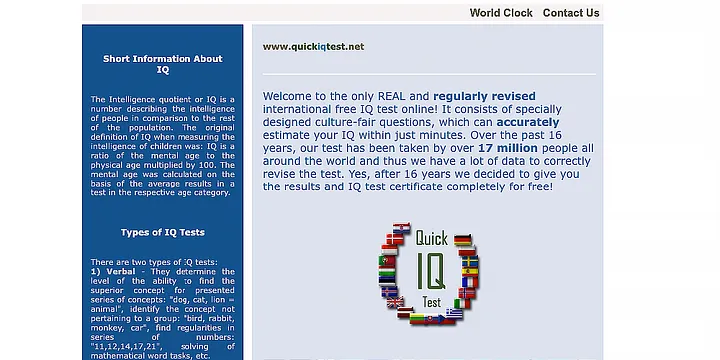
This online test consists of 22 questions with a 25-minute limit. Results are available instantly, but there is a fee to receive the score, a printable certificate, and a detailed report.
IQTest.com: A free general IQ test, offering score details without charge. An in-depth report is available for a fee, analyzing performance in 13 key areas of intelligence. The site claims over 19 million tests taken, and it offers a program for cognitive improvement.
International High IQ Society: Offers membership based on scoring in the top 5% on the Culture Fair Intelligence Test, which is 25 questions to be answered in 30 minutes. The test focuses on matrices and is designated ‘Culture Fair’ due to its non-language-based nature.
4. Brain Metric
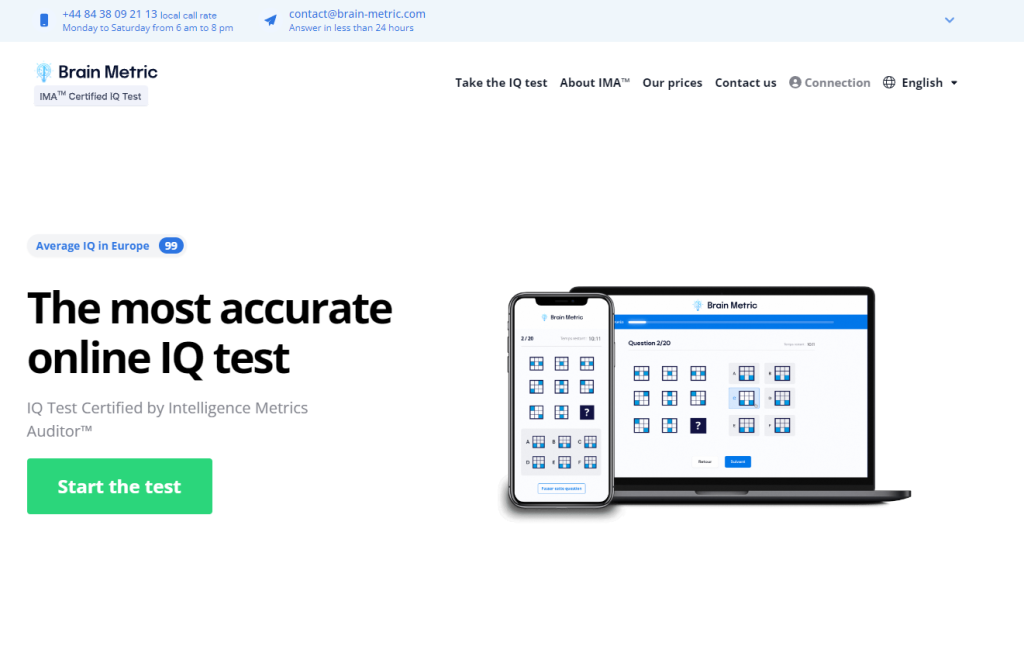
A straightforward and free online IQ test with 20 multiple-choice questions and no time limit. This test doesn’t require personal details like an email address for result delivery.
4. Free-IQTest.net

Offers a simple and easy IQ test with approximately 20 questions. It provides additional resources about IQ tests and practice questions.
5. MyIQTested.com
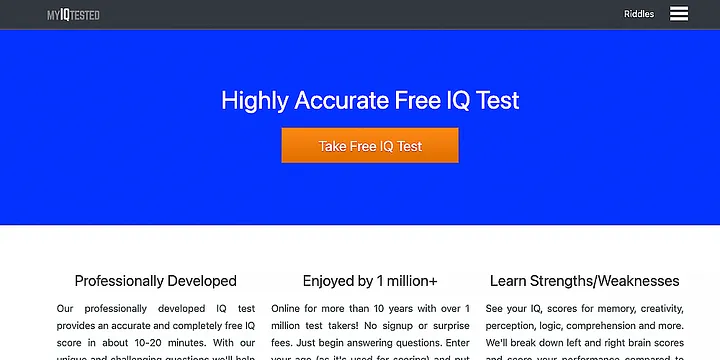
A non-timed test requiring only your date of birth to start. The site offers resources about IQ and testing in general, and a report focusing on various facets of intelligence is available after completion.
6. IQ Exam
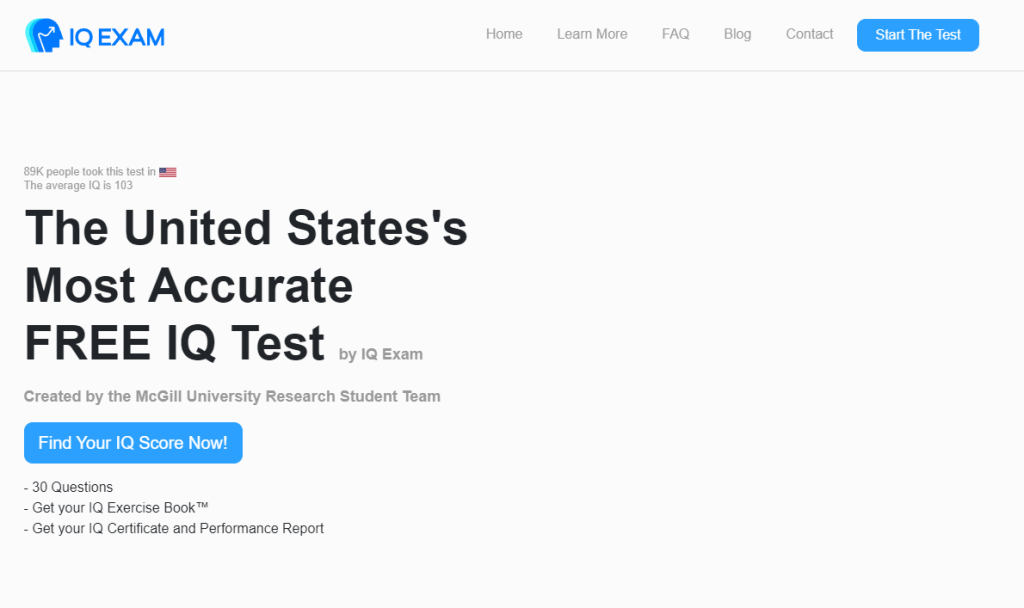
Created by the McGill University Research Team, this test consists of 30 questions and is not timed. It evaluates performance based on non-verbal multiple-choice questions, offering a basic report for free.
7. Wechsler Adult Intelligence Scale (WAIS):
A highly trusted IQ test for adults, focusing on verbal and performance abilities with 14 subtests. The WAIS-III takes about 60-75 minutes to complete.
8. Stanford-Binet Intelligence Scales (SBIS):
One of the most widely used IQ tests, the SB5 edition includes 10 subtests covering five factors of cognitive ability. It’s known for its comprehensive coverage of cognitive abilities.
9. Brain Metrics Initiative (BMI) Online IQ Test:
A 20-question test by the Brain Metrics Initiative. It offers a free demo test and a more in-depth certified test for a fee, including a score, certificate, and performance report.
10. Woodcock-Johnson Tests of Cognitive Abilities:
A set of subtests assessing various cognitive skills. It requires reading and writing, covering a wide range of cognitive abilities.
11. IQ Test Labs
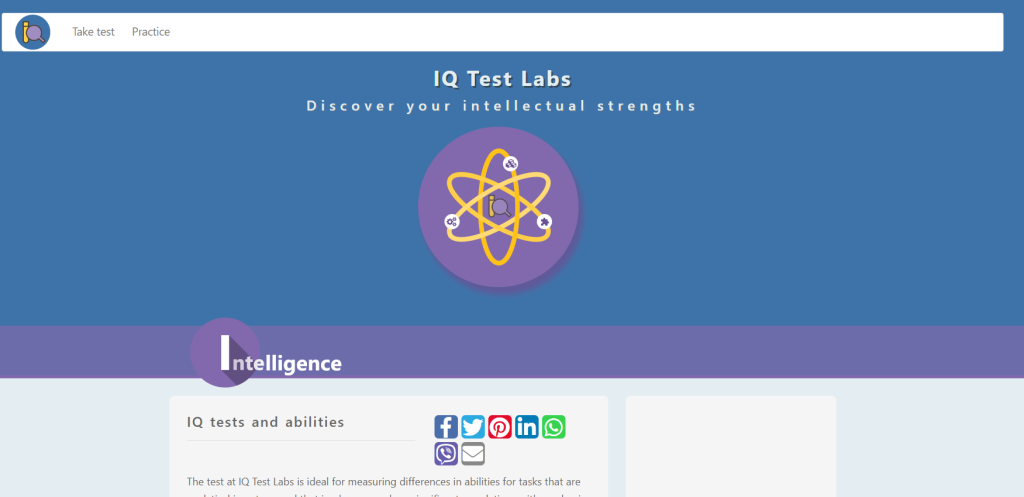
This online test asks 30 questions in a timed setting. It measures skills similar to other prominent IQ tests and provides a score report indicating strengths and weaknesses.
12. Raven’s Progressive Matrices:
A nonverbal test focusing on problem-solving and reasoning skills, requiring test-takers to complete patterns of geometric shapes. It’s available in Standard and Advanced versions.
13. PsychTests
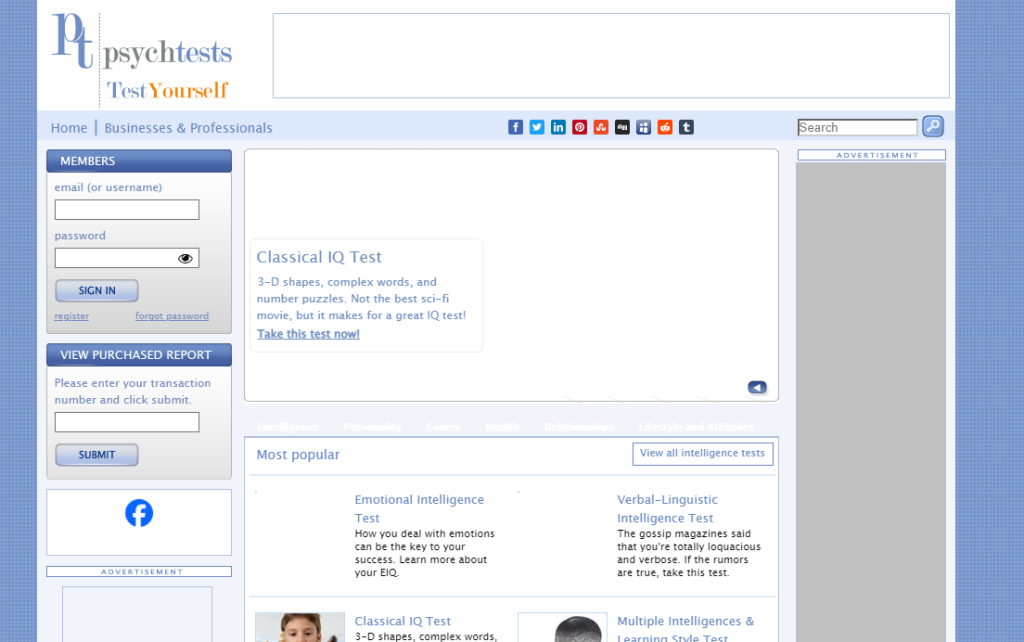
Offers a variety of free IQ tests, including a classical IQ test, a logic IQ test, a culture fair IQ test, and tests focusing on visual-spatial and verbal-linguistic intelligence.
14. Rutherford Intelligence Analysis
Developed by psychology experts from Duke and Harvard, this test is designed to be representative of official IQ tests. It offers accurate scoring and detailed results for a fee.
15. IQExam.org

A 25-minute test asking 43 questions on spatial reasoning and word analysis. Free results are provided, but registration is required.
Understanding Your Mind: What IQ Tests Reveal
Think of your brain like a powerful computer. Just like computers run tests to check their speed and abilities, an IQ (Intelligence Quotient) test is a way to measure certain aspects of how your mind works. It’s been around for over a century, first used to help figure out which kids might need some extra support in school.
What Does an IQ Test Measure?
At its heart, an IQ test is a set of puzzles and challenges that look at how good you are at things like solving problems, spotting patterns, remembering information, and working with language. The whole test is set up so most people score right around 100. Scores way above or below that can be a sign of a mind working on overdrive or one that needs a bit more practice to reach its full potential.
IQ tests come in all shapes and sizes and people take them for a bunch of reasons – figuring out school programs, exploring possible learning differences, or even just plain curiosity. It’s super important to remember that they don’t show the whole picture of someone’s smarts. How well you get along with people, your creativity, and things you’re good at outside of school don’t show up on an IQ test, but they definitely count as being clever!
Some folks argue that IQ tests can be unfair to people from different backgrounds. It’s also true that one number isn’t going to explain everything about how amazing and unique your brain is.
Ready for a Brain Workout? How to Take an IQ Test
If you’re curious to give those mental muscles a flex, here’s the lowdown on IQ tests:
- Do Your Homework: There are different IQ tests with different focuses. Think about why you’re interested in taking one – that’ll help you pick the right test.
- Prep Your Brain: Get some sleep and eat healthy. A tired, hungry brain won’t show its best! You can even try some online practice puzzles to get your mind limbered up.
- Know the Game: Tests look at things like words, numbers, and patterns. Knowing the types of questions will make you less nervous.
- Follow the Rules: The test instructions are super important, so follow those closely.
- Time Master: Some parts are timed, so keep an eye on the clock.
- Breathe! Feeling stressed won’t help. Take a deep breath, and focus on one question at a time.
- Check It: If there’s time at the end, make sure you didn’t miss anything.
- It’s Just a Number: IQ score isn’t the whole story about you. Ask a teacher or counselor to help you understand what it means.
- Use It!: Results can help with school plans, or just point out areas where your mind rocks.
- Try Again: You can always retake a test in the future. Maybe your score will change!
Remember: An IQ test is like a snapshot of your mind on that particular day. Lots of things affect your performance beyond just how your brain naturally works. Think of it as one interesting tool for figuring out your own personal brand of brilliance!


